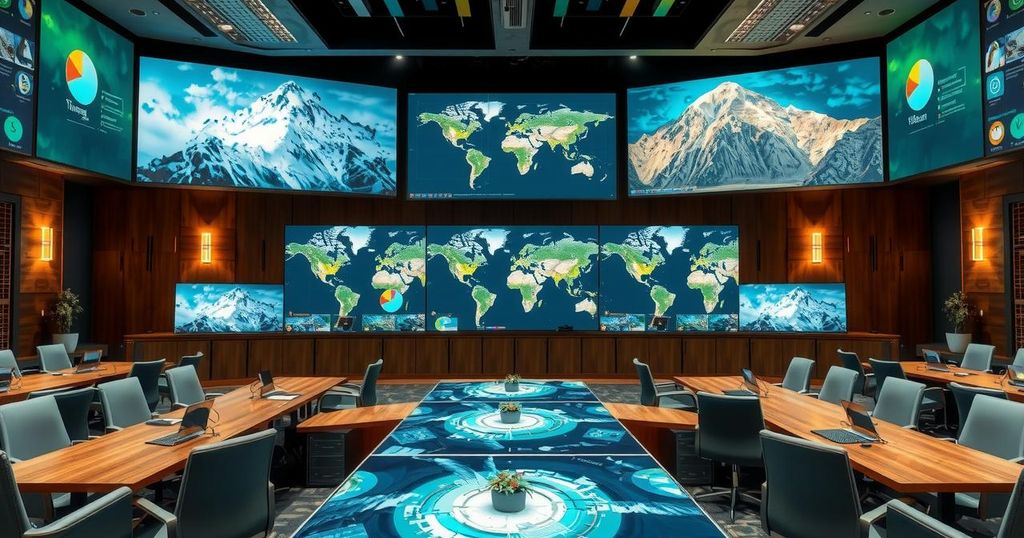The beginning of 2025 has highlighted the link between extreme weather events, such as severe winds and wildfires, and climate change, with 2024 marking the hottest year on record. Advances in climate science now allow for discernment of this connection, showing that daily weather patterns are increasingly influenced by a warming climate.
The onset of 2025 has seen an array of extreme weather phenomena affecting various regions, particularly in Southern California, where winds reached velocities of 100 mph, resulting in unprecedented wildfires. Concurrently, severe winter storms have blanketed the Mid-Atlantic and Southern U.S. with snow and frigid temperatures. Alongside these events, experts from leading meteorological organizations have attributed 2024 as recorded the hottest year in human history due to anthropogenic climate change.
Traditionally, scientists maintained that specific weather extremes could not be directly linked to climate change, but advancements in climate science over the past decade have enabled researchers to discern the influence of climate change on disastrous weather occurrences such as heat waves, hurricanes, and wildfires. While not all weather anomalies can be directly correlated with climate change, a noticeable trend in the rise of global temperatures is now evident in an array of extreme weather events. Justin Mankin, a climate scientist at Dartmouth College, remarks, “The trends in climate are shaping new weather possibilities that were maybe unprecedented.”
A distinction exists between weather and climate; the former can be defined as the day-to-day atmospheric conditions while the latter refers to the long-term patterns averaging over a 30-year span. As articulated by Danielle Touma, a climate scientist at the University of Texas, Austin, “The climate is basically the clothes you have in your closet, but what you pick out to wear every day tells you about the weather.”
As the planet’s average temperature has climbed approximately 1.3 degrees Celsius since the mid-1800s due to fossil fuel combustion, modern weather does indeed reflect a transformed environment, although these changes may manifest subtly rather than overtly. Deepti Singh, a climate scientist at Washington State University, emphasizes that, “Everything we’re experiencing, it is occurring in a different environment,” suggesting that daily weather is now influenced by these climatic alterations.
Multiple regions, including states like Michigan and Ohio, report fewer freezing days compared to a climate unperturbed by human actions, with heat waves having more than tripled in frequency in the United States since the 1960s. Extreme climatic events such as the deadly heat wave witnessed in the Pacific Northwest in 2021 can also be traced back to climate change, signaling novel atmospheric patterns previously absent in the region.
Recent scientific advancements have led to the development of methods known as “detection” and “attribution,” which enable scientists to simulate the climate and its manifestations without human influence. By contrasting these simulations with current data, researchers can ascertain the extent to which climate change impacts specific weather events. Mankin likens this method to clinical trials, noting that deviations serve as key indicators of human influence on weather phenomena.
The article addresses the significant impact of anthropogenic climate change on recent weather patterns as observed at the beginning of 2025. In detailing extreme weather incidents such as intense winds, wildfires, and severe snowstorms, the piece contextualizes these occurrences within the framework of increasing global temperatures attributed to human activities. It highlights advancements in climate science, particularly in attribution studies, which have enhanced scientific understanding of how climate change influences weather extremes. The article underscores the critical distinction between climate (long-term averages) and weather (daily deviations), further elaborating on how these elements are intertwined.
In conclusion, the effects of human-induced climate change are emerging in various forms, with an observable increase in extreme weather events correlating with the rise in global temperatures over the past century. The refinement of scientific techniques has allowed for a clearer understanding of the relationship between climate change and weather phenomena. As the planet continues to warm, the expectations of future weather patterns may be drastically altered, necessitating increased awareness and adaptation strategies.
Original Source: laist.com




